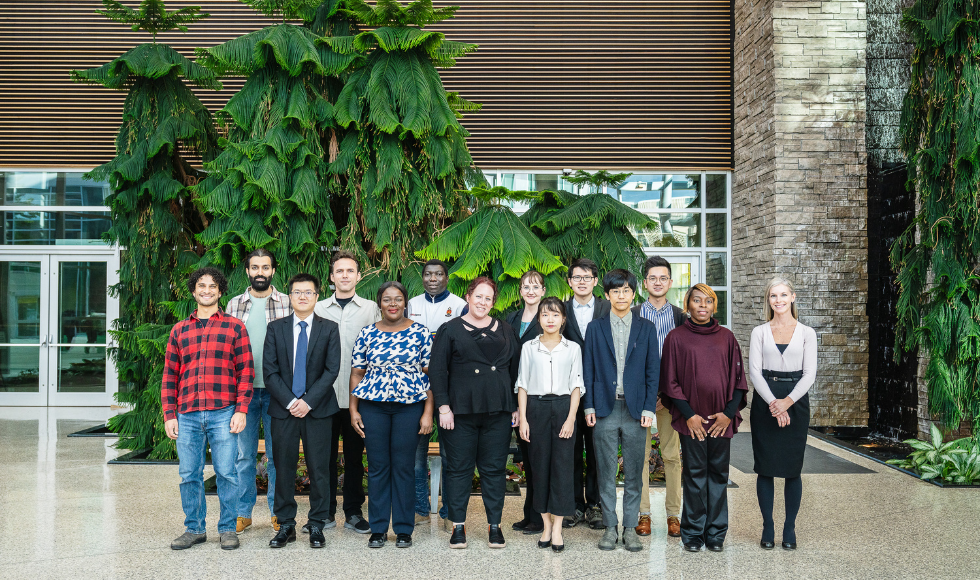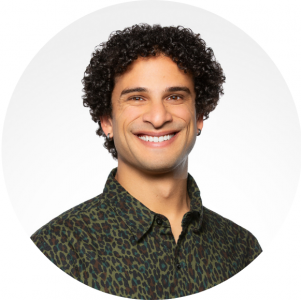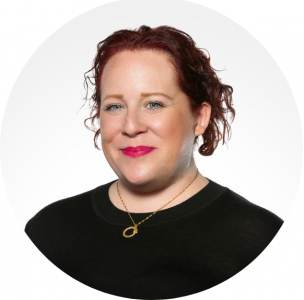Fostering leaders: McMaster prepares postdocs for the next step in their careers

Fourteen postdoctoral fellows meet weekly from September to May to learn and practice teaching and leadership skills rooted in evidence-based research.
BY Peter Rukavina
March 5, 2024
Within the Life Sciences Building, a collection of deer mice is a welcome sight. They aren’t pests — they’re visitors from the Rocky Mountains and elite athletes of the natural world.
If you ask most scientists why these mice are important, they could say they are researching metabolic adaptations to hypoxia using populations of Peromyscus mice that inhabit an altitudinal gradient.
Clear as mud?
But if you ask zoologist Derek Somo, a McMaster postdoctoral fellow, he’ll tell you that these mice help us understand why some animals adapt and survive better than others.
For many talented scientists, engineers and scholars, crafting a simple explanation is not that easy. After all, they are subject matter experts in highly technical and complicated areas.
Somo wanted to pair his technical expertise with the ability to lead others and effectively communicate his research.
“Many researchers hear a lot of skepticism around science, so there’s an impetus to really communicate why anyone’s research is necessary,” says Somo. “It matters that you be able to speak to people who have no science background.”

In September, he joined the McCall MacBain Postdoctoral Fellows Teaching and Leadership Program, an eight-month, one-day-a-week training program for the next generation of high-performing teachers, researchers and leaders.
The program, which has supported 46 McMaster postdocs since its inception, is nearing the end of its fifth year.
Somo and a small group of postdocs with widely differing backgrounds are also the first cohort to study under the program’s new Postdoctoral Leadership Certificate, which guides postdocs to develop pivotal career skills that often go untaught. The certificate is the first of its kind in Canada, offering an unrivalled opportunity for postdocs.
Leaders and communicators
What happens when a talented researcher struggles to share their vision? What happens when a subject matter expert doesn’t communicate why their work matters? What happens when an academic rock star can’t motivate and engage colleagues?
“Then you’re just another individual contributor,” says Monique Armstrong, an assistant clinical professor in McMaster’s Department of Psychiatry & Behavioural Neurosciences.
Armstrong has been a foundational contributor to the Teaching and Leadership Program since it was established in 2019, thanks to generous support from the McCall MacBain Foundation. She is a high-profile consultant who bridges academia and industry. In her words, she helps leaders get out of their own way as they try to create an environment of performance.
“Subject matter experts are really good at what they do. They get results. Sometimes, they work their way up the ladder to lead others. But the truth is that leadership isn’t about them getting results, it’s about fostering an environment for others to get those results. So their subject matter expertise is only one small component of their success as a leader.”
The Teaching and Leadership program embodies one of McMaster’s key priorities. By investing time and resources into postdocs – considered by many to be the engines of research at any university – McMaster is continually advancing its quality and standard of research.
The new Postdoctoral Leadership Certificate is evidence of this investment. In collaboration with the DeGroote School of Business Executive Education program, the Teaching and Learning program created the 30-hour certification for postdocs to complete evidence-based training modules in vital areas of professional development such as presence, communication, emotional intelligence and entrepreneurship.
A grounding in leadership skills
Every week, these postdocs gather to review, analyze and discuss the challenging areas that subject matter experts can find themselves in. The certification’s training modules lay out the leadership skills necessary to be successful in a working space with peers, a government forum to discuss public policy, a meeting to pitch a business idea, the corners of the internet to market published research and many other scenarios.
By April, this cohort of subject matter experts will have not only the skills to be leaders in their fields, but certified proof that they have completed rigorous leadership training in addition to a full-time postdoctoral work schedule.
“Programming that sounds like standard skills in the working field is actually a tremendous challenge. For many people, these are new experiences,” says Sheena Jary, an expert in 17th-century metaphysics, natural philosophy and leadership, also part of the certificate’s inaugural cohort.
For the last three years, Jary has effectively taught leadership-themed courses across McMaster. Yet when she came across the Teaching and Leadership Program, she couldn’t pass up the opportunity to continue growing.

“I have a lot of teaching and leadership experience behind me, but the McCall MacBain program has made me realize that there is always more to learn,” says Jary.
Armstrong says these new experiences create psychological agility by embracing discomfort to tackle new challenges and growth. She enthusiastically admits that the lessons and assignments that Jary, Somo and other program postdocs face will “shift the ground beneath them,” forcing them to view their areas of expertise with a new leadership perspective.
“The McCall MacBain program is ahead of the curve,” says Armstrong. “This is an opportunity to get comfortable with discomfort, to try things out and to potentially even fail.”
For the remainder of the 2023-24 Teaching and Leadership Program, Jary and Somo will face assignments and lessons designed to prepare them for the next stage in their careers. Whether they pursue a career as a professor, industry researcher or any other role, they will have the confidence, experience and knowledge to lead others.
The McCall MacBain Postdoctoral Fellows Teaching and Leadership Program is led by Joe Kim, program faculty advisor, and Katie George, program manager and research coordinator. To learn more about this program, please visit the following link.


